- News
- Interview with international exchange students
Interview with international exchange students
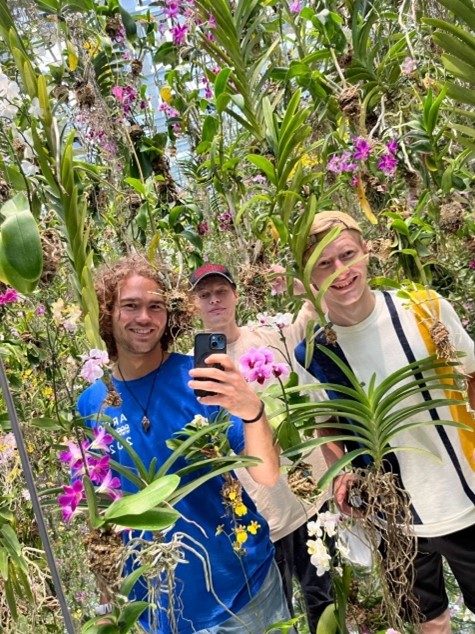
- Posted
- Tue, 30 May 2023
Four exchange students shared their experiences of life in Japan and at Waseda University. The participants were undergraduate students Ben Decker and Tom Bohlaender from the German Sports University, Cologne, and graduate students Kuan Tsen Li form the National Taiwan University, and Sheng Li from the Shanghai Sports University.
Mr.Tom BOHLAENDER: German Sports University Cologne,
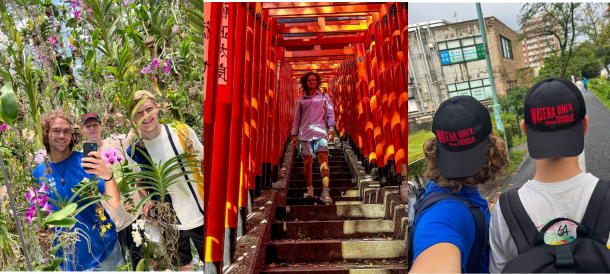
Q1. What made you decide to come to Waseda to study?
I was looking thru the list of partner universities that my home university, German Sport University Cologne has and I noticed Waseda because it is located in Tokyo, a big City which I really wanted to see. After some research about Waseda I was also impressed about the University and so my decision was set.
Q2.What are you currently studying at Waseda?
Sport Management
Q3. How did you find the typical class sizes?
The class size for me was as I expected it. Some classes where pretty small (5) and other open classes where big with over 50.
Q4. Please describe one memorable experience with a professor and/or class.
On one Thursday lunch time our professor joined the Banh Mi group, we were eating Banh Mi every Thursday, and we were sitting in the park of Waseda Campus and talked about everything.
Q5. Tell us about your campus life at Waseda University.
I had classes on different campuses, so it was different. At the Waseda Campus we had class in the morning then got some Bento Boxes and ate lunch in the park. At the Higashi Fushimi campus we were watching a lot of different sports.
Q6. How easy or difficult was it for you to meet people and make friends as an international student?
It was not that difficult. I joined a social Media group with full of international students and we met often. After that you will pick your buddies and become friends. It was difficult to find Japanese friend because of language barrier. But if you can overcome the language problem you will find out how friendly the people are.
Q7.What differences do you perceive between Japanese and German universities?
The loudness. In German Universities it is much loader than in Japan. The easier access to courses or circles is defiantly in Germany. Almost all of the circles didn’t reply if you text them in English.
Q8. How would you describe the dorm life – rooms, dining options, location, social opportunities?
My dorm is located in Kodaira so far outside of Tokyo. I am lucky that there are two other German guys living in the dorm. The rooms are big enough and the food is okay. The timetable for breakfast is too early tough.
Q9. What surprised you the most when you came to Japan?
That the people are still using Fax. Some people use still No-smart Phones. Tokyo is bigger than I thought. Living in Japan is more expensive than I thought.
Q10. What did you gain from studying at Waseda University?
If you don’t have a problem, you don’t need to talk about strategy. That is an important sentence as a manager and my professor told me that. It was the same Professor with which we were eating Banh Mi.
Q11. What are your plans and outlook for the future?
In the future I have to come back to Japan because I couldn’t climb Mount Fuji, because when I arrived the season was over. But in in my study-life I will probably do an internship at a sports company somewhere else. Because I want to see the whole world.
Mr.Ben DECKER: German Sports University Cologne,
Q1. What made you decide to come to Waseda to study?
I always wanted to come to Japan and to experience the unique culture, food and friendly people. I have chosen Waseda because two of my Mentors suggested me to go to Japan and especially Waseda because of the great reputation and the level of education.
Q2. What are you currently studying at Waseda?
I am currently studying Sports Management, but I am focusing more on general business by attending open courses. This is very helpful for me to have this opportunity in Japan which I don’t have in Germany.
Q3. How did you find the typical class sizes?
It is very nice and comparable to the class size at my University in Germany.
Q4. Please describe one memorable experience with a professor and/or class.
I have attended at Waseda the best course I have ever attended so far. It was an open course about “Winning strategies for Asia “. The fascinating knowledge of the professor, the way of presenting, teaching, and reflecting impressed me the most. I have learned a lot as a student and person and enjoyed every second of it. Also, the fact that the professor catches up with us students besides the studies was very valuable for me.
I also enjoyed the opportunity to train and coach the Waseda Handball team. They train on a very high level, but the style of play is slightly different to German/European Handball.
Q5. Tell us about your campus life at Waseda University.
Unfortunately, I could not experience the campus life a lot because of the location of the dorm which forced me to go home early. But the days I could go to the main Waseda campus were great because I could meet new friends for lunch and meet new people on campus.
Q6. How easy or difficult was it for you to meet people and make friends as an international student?
It was easy to make friends with other international students. Especially Japanese students who have spent time abroad were very interested to have a conversation which was also nice.
Q7. What differences do you perceive between Japanese and German universities?
I must say that German universities are a bit more flexible than in Japan, but we got used to it very quickly. The campus in Japan impressed me a lot and the community feeling which you can experience if you attend games of Waseda’s sports teams.
Q8. How would you describe the dorm life – rooms, dining options, location, social opportunities?
The dorm life was besides the long ways of commuting a good experience. We quickly made friends with other international students. Unfortunately, Japanese students who also lived in my dorm didn’t show interest in any conversation with us or other students, which surprised me a lot.Sometimes Japanese breakfast was very challenging as a European and also the time slots for breakfast were very early.
Q9. What surprised you the most when you came to Japan?
I must say that I have never experienced a culture shock in Japan, but many things surprised me a lot. Japanese people are very quiet and there is complete silence although the train is filled with many people. I got used to the silence and the impressing tidiness of the city very quickly. Tokyo is such a safe place where you can lose your wallet (happened to me) and get it back just 8 minutes after. People are very helpful and polite.I would love to stay longer because Japan became my favorite country in the world.
Q10. What did you gain from studying at Waseda University?
Besides new friends, I gained a lot of knowledge about strategy and found out that I want to lay my academic focus on that in the future.
Q11. What are your plans and outlook for the future?
After returning to Germany, I will finish my studies and aim for a Master’s program abroad.
I will also try to establish an exchange program with one of Germany’s top Handball teams and the Waseda University Handball team.
Ms. Sheng Li: Shanghai University of Sport
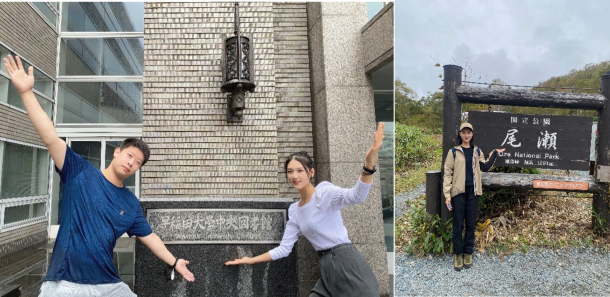
Q1.What made you decide to come to Waseda to study?
Waseda University is a world-renowned university and one of the comprehensive academic institutions with a long history in Japan. When I was an undergraduate, I always dreamed of going to Waseda to study. So when I learned that there was an exchange program, I did not hesitate to submit my application.
Q2.What are you currently studying at Waseda?
I am currently studying sports culture and sports management related courses in Faculty of Sport Sciences. Such as Historical Foundations of Modern Sport、Sport Consumer Psychology and Sports and New Media,etc..
Q3. How did you find the typical class sizes?
The class sizes at Waseda University are smaller than those at my home university. Classes in Waseda are often conducted in the form of group discussions, where everyone exchanges ideas and the classroom atmosphere is relaxed. I think this format of teaching encourages people to think and express themselves.
Q4. Please describe one memorable experience with a professor and/or class.
What makes me memorable is that Professor Wong often brings us snacks in class, and the students also share the specialties they brought when traveling. Both professor and classmates in the class made me feel very warm.
Q5. Tell us about your campus life at Waseda University.
I want to use the word “colorful” to describe my campus life in Waseda. Waseda’s advanced library has provided convenience for my study, and the teachers have also helped me a lot. I was deeply impressed by the grand campus festival. Various clubs and performances made me further understand the culture of Waseda and Japan. In different seasons, I can enjoy different sceneries in the Waseda campus. The internationalization of the school gives me the opportunity to make friends with some foreign students.
Q6. How easy or difficult was it for you to meet people and make friends as an international student?
As we all know, Waseda University is a highly internationalized university, so I often meet students from all over the world, as well as Chinese students from my country. Everyone is very enthusiastic and we communicate in English, Japanese and even Chinese. So I think as an international student, it is not difficult to make friends.
Q7.What differences do you perceive between Japanese and Chinese universities?
From my personal point of view, first of all, the size and model of the classroom are different. The number of Japanese universities in class is relatively small, and the class is often conducted in the form of group discussion. Chinese universities have a large number of students in class, and there are also group discussions but not many.Secondly, the dormitories of universities in the two countries are different. Usually, the dormitories of Chinese universities are on campus and very close to the teaching buildings. But I found that Japanese universities’ dormitories are usually some distance away from the campus.
Q8. How would you describe the dorm life – rooms, dining options, location, social opportunities?
The dormitory I live in is WID Tokorozawa. We share common areas such as dining room, bathrooms and laundry etc, but everyone has their own room. Having my own space is great. We can pre-order food on the app in advance, and the food is rich in variety and balanced in nutrition. The location of the dormitory is very good, just a few minutes walk to the station. There is a bustling commercial street and several supermarkets near the dormitory, which are very convenient and can meet daily needs. The students in the dormitory are very enthusiastic and easygoing. Sometimes we hold some outdoor social activities, and I made some friends in the dormitory.
Q9. What surprised you the most when you came to Japan?
What surprised me the most when I came to Japan was how cosmopolitan and inclusive the country is. People are full of personalities and styles, and they are confident and free to do what they want. I think Tokyo is a very interesting city, whether it is day or night, it is full of freshness. The cleanliness and perfection of public facilities in Japan are the same as my impression.
Q10. What did you gain from studying at Waseda University?
Through studying at Waseda University, I have a better understanding of the history of sports development, sports management and sports culture in various countries. I have a more in-depth thinking about sports media communication, the problems faced by the sports industry and the countermeasures. At the same time, I learned about different cultures by getting along with classmates from different countries.
Q11. What are your plans and outlook for the future?
The year of studying at Waseda University allowed me to grow a lot. I realize the importance of language, which is the bridge between us and the world, so I will always keep learning English and Japanese. I am very interested in cultural communication, so my future career plan is to become a (sports) reporter. I hope to work hard in the field I like in the future.
Mr. Kuan Tsen, Li: National Taiwan University
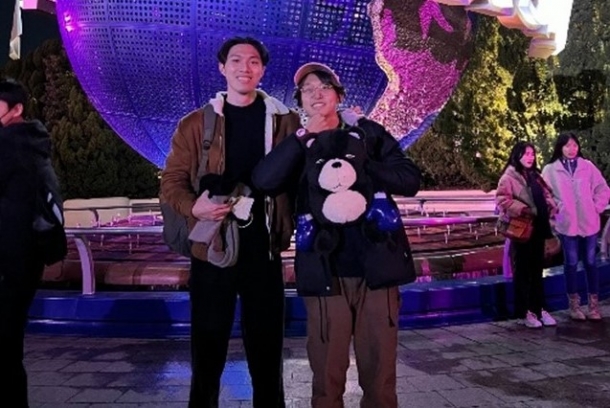
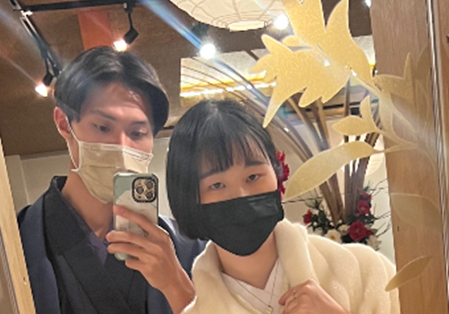
Q1.What made you decide to come to Waseda to study?
There are some reasons to make me here. First, I’ve been to Japan several times before, including a three-weeks working holiday in Kanazawa, which is one of my best memories in my life. These experiences make me kind of attached to Japan and wants to learn more about this place. Second, sports industry in Japan is way more diverse and mature than Taiwan, and I believe that I could learn a lot from that since there’s such a cultural and societal similarity between Japan and Taiwan compared to those American or European countries. Last but not least, Waseda University is super famous in Taiwan, especially for its sports-related academics, so I got my teacher and my family’s full support to spend months studying here. Fortunately, there’s an exchange student contact between my master program in National Taiwan University and Faculty of Sport Sciences in Waseda University, so I got a chance to take academic exchange here and luckily, I didn’t miss it.
Q2.What are you currently studying at Waseda?
I’m majoring in sports management in Taiwan; thus I took some related courses here, including “Sport in Society”, “Contemporary Issues in Sports”, “Global Development of the Sport Industry”, and “Sport Finance and Economics”.
Q3. Please describe one memorable experience with a professor and/or class.
I would say the presentation on Dr. Donna’s class would be the most memorable one. I have confidence in my presentation and slide making skills, but when it comes to another language, it’s a totally different story. The one on Dr.Wong’s class is my first time giving an English presentation (and also the first presentation at Waseda), so I was super nervous then. Fortunately, everything was going well and I even got some compliments. That means a lot to me.
Q4. Tell us about your campus life at Waseda University.
I have two courses for fall and winter quarter respectively, so I just have to get to school 2~3 days a week. Courses here were so different from the ones in Taiwan. There’s plenty of discussion in classes, so I could learn a lot from my classmates and professors about sports issues in their countries and also their own culture. Also, though it’s still challenging, I feel like my English and Japanese skills are getting better and better through these on-class discussion and daily conversation. On the rest of the week, I’ll learn Japanese through online classes, complete my master thesis in Taiwan, hang out with my friends, have some volleyball plays in a local club, and go traveling to experience Japanese culture and lifestyle. I love the campus life here so much!!
Q5. How easy or difficult was it for you to meet people and make friends as an international student?
Actually, it’s not difficult to meet other international students here even though there’s a language barrier. People here are very nice and lovely. However, it’s challenging for me to make Japanese friends here. The main reason is that I can barely speak Japanese, and also there’re only few chances to communicate with them at Higashi Fushimi campus. I should have improved my Japanese level then coming here haha.
Q6. How would you describe the dorm life – rooms, dining options, location, social opportunities?
Everything is pretty good! The only concern I’ve been always struggling with is the commuting issue. I have to take 80 minutes from dormitory to school. What’s worse, it’s pretty easy for me to get into a car sick (also “train sick” and “bus sick” here), so I’m usually not feeling well on classes after a long commute like that:
Q7. What surprised you the most when you came to Japan?
I’ve come to Japan several times, so there’s almost nothing surprising. However, I found it very interesting that lots of Japanese people thought that I’m a Japanese and were surprised after they found out I couldn’t speak Japanese. That just surprised me and was so hilarious because people recognized me as an Indonesian or a Filipinos when I visited here few years ago. That change was just so dramatic.
Q8. What did you gain from studying at Waseda University?
I think the most important and valuable gain is the communication between professors, classmates and myself, which let me be able to learn more about the sports issues worldwide and think back to my own country. Also, again, I’ve improved my English and Japanese skills via those discussion, course speech, presentation, and daily conversation. Extracurricular activities are also impressive. I’ve watched a lot of sports games such as V league, Japan handball league, B league, Volleyball Haruko, FIFA World Cup, Hakone Ekiden, games of Waseda Volleyball Team at the stadium with my friends or with strangers at the bar. Watching games, doing sports with local people, going to gym, these experiences are not only memorable, but also help me learn more about local sports culture and how the events worked.
Q9. What are your plans and outlook for the future?
I’ll graduate and earn my master degree right after I get back to Taiwan in February, and start to look for a job after finishing a four-month military service. Working in sports industry is always my goal, especially in fields of sports management or marketing in professional sports. Thus, I’ll put effort into job hunting and also improve my English and Japanese level simultaneously in case there’s a dream working opportunity overseas.
- Tags
- General
